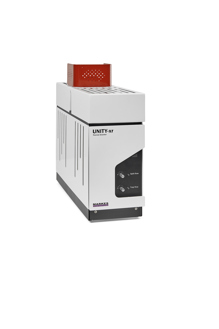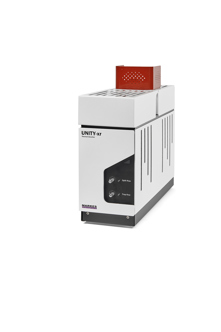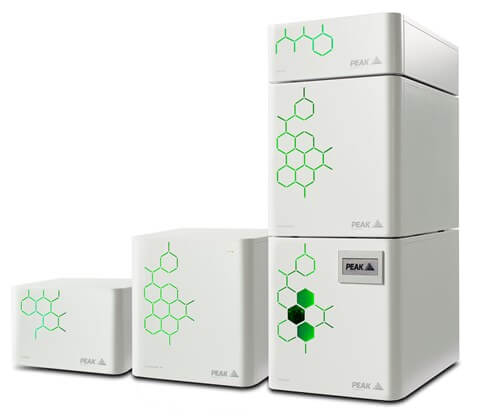Markes New Unity XR Makes the Switch from Helium to Hydrogen Carrier Gas
Helium shortages are not a new phenomenon in the lab world. Having just come out of helium shortage 3.0, it’s time that instrument manufacturers start looking at alternatives to helium so that labs are not negatively affected by these shortages and faced with a backlog of analysis they are unable to run. Moving to an on-demand hydrogen generator to support these instruments is the best alternative to avoiding your reliance on these external supplies.
Markes International have done just that. In a world first for Thermal Desorption instruments, Markes have developed and designed their Unity XR, Ultra XR, Unity Ultra-XR Pro and TD 100-XR with their Multi-Gas technology which allows the instruments to be run with helium, nitrogen or hydrogen.



The Unity XR from Markes International
Compliance
PEAK were delighted to collaborate with Markes by providing hydrogen gas generators to be used in the testing of their TDS systems. Each of the Markes instruments have been externally tested and validated by an independent compliance body so that the full TD-GC-MS analytical instrumentation and workflow can be configured to work safely with hydrogen as carrier gas. By making this shift in gas supply, the Markes XR range now allows users to move away from the use of gas cylinders in their analysis and make a switch to gas generators, such as PEAK’s Precision series.

PEAK's Precision range of gas generators
Why should you switch from helium to hydrogen?
There are a number of benefits in switching from helium carrier gas to hydrogen and many of these factors have been intensified over the last two years with the impact of COVID and the myriad supply chain issues that industries have had to face.
Productivity
As a carrier gas, hydrogen is also able to offer faster chromatographic separations, shorter method time and lower temperature separations than helium, due to hydrogen’s lower viscosity which can provide your lab with faster analysis with no compromise on results. This can drastically increase your lab’s throughput which extends the lifetime of your consumables and increases periods between maintenance.
The added benefit of an on-site gas generator is that you are able to reduce downtime almost completely. Your lab no longer needs to worry about running out of gas during analysis or to waste time changing gas cylinders. With a hydrogen generator from PEAK you can provide your instrument with on-demand carrier gas which will never run out – meaning your analysis can run at any time.
Performance
Markes Multi-gas enabled Thermal Desorption instruments allow recollection and repeat analysis to eliminate data-loss, confirm results and validate analyte recovery in compliance with international standard methods.
By using hydrogen during testing, it has been shown that hydrogen carrier gas routinely produces high-quality data and delivers results that comply with global tube-based TD-GC-MS standards.
Savings
While switching from helium to hydrogen can save you money based on cylinder prices alone, a PEAK gas generator eliminates cylinder costs altogether from delivery and rental costs, to system maintenance and pressurized gas supply lines.
Longevity
Rising gas prices are having an adverse effect on labs across the globe. By allowing instruments to run on helium, nitrogen and hydrogen, Markes is providing labs with an opportunity to take control of spiraling costs.
By no longer relying on helium as a carrier gas, labs can move away from cylinder usage and move towards the more sustainable route of in house gas generation. This is a more sustainable option environmentally, financially and for personnel. With an on-site gas generation solution, you only need to consider the initial cost and delivery of your new gas generator instead of factoring increasing monthly cylinder outgoings into your lab’s budget.
Green
Sustainability and the environmental impact of labs is becoming a higher priority for many labs than it was in the past. With a PEAK Hydrogen Generator, you can produce high-purity hydrogen, at the touch of a button, from de-ionized water. This can provide your lab with a sustainable carrier gas that can be used for years to come.
Unlike hydrogen, helium is a non-renewable gas that is extracted through energy-intensive methods. This then needs to be shipped and stored using specialist equipment which causes significant environmental impact.
With an in-house gas generator you can eliminate the need for cylinder deliveries and significantly reduce your lab’s carbon footprint.
Conclusion
With Markes making this shift from Helium to Hydrogen possible, they are starting important work in creating lab instruments that no longer need to rely on Helium to run. Given such a push within labs across the globe to adopt more sustainable and green processes, this shift from Markes can have a real impact on how labs operate and, in future, we hope to see many more instrument manufacturers following suit.